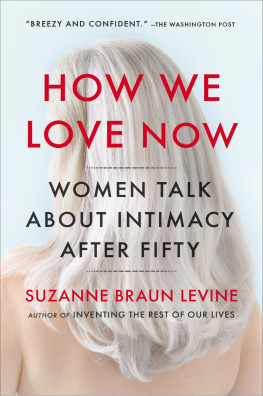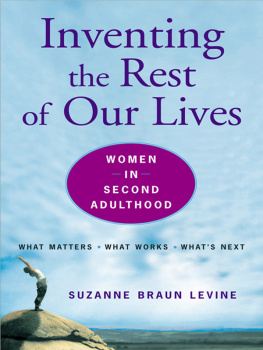Thanks for downloading a Shebook.
click here, or visit us online at shebooks.net.
All rights reserved. No part of this book may be reproduced, scanned, or distributed in any printed or electronic form without permission.
Can Men Have It All?
Mike and Diane were both deeply committed to their careers when they got married five years ago. For the most of that time the security, support, and sheer fun of being married seemed to compound the enthusiasm they brought to their work. Their game plan had always included having childrenboth of them had grown up in large, warm familiesand Diane got pregnant right on schedule. She worked through her pregnancy at an architectural firm in their hometown of Houston, up to the first labor pains, having arranged everything she would need when the baby arrived. The firm had a well-established maternity-leave policy, and she signed up for four months off. When Delia was born, Mike and Diane, both in their late 20s, expected to immerse themselves in caretaking. They both adored her. But Diane was there. Mike was not.
Soon most of the tending to Delias needs fell to Diane, as did most of the bonding, playtime, and walks with Delia nestled in her stroller. An increasingly fine-tuned connection with the baby became second nature to Diane. The same experiences became special occasions for Mike, whose work as an attorney was as demanding as ever in terms of both time and attention.
At this point in the story, one might expect to hear about Dianes resentment of Mikes unbroken career track, his freedom to come and go in child care, his lack of understanding of what her day was like. But that is not the story. In fact, Diane was very happy to return from maternity leave to a three-day week at the architectural firm. She had made peace with what she saw as necessary trade-offs between the drive toward an all-systems-go career trajectory and the pleasures and demands of parenthood.
It was Mike who was resentful and conflicted. He had looked forward to the egalitarian family life; he expected to be there for the serendipitous and mundane moments of parenting. He hated being a guest in his babys world.
He was also beginning to feel anxious about his job. Was he concentrating as intensely as before? Was he shortchanging the team-spirit time with his bosses in order to get home sooner? Was he losing his edgeand the guarantee of financial success? And why was it that Diane seemed to have all the luck, including the intimacy with the baby that he missed, the job satisfaction, and the domesticity he felt too wired to enjoy? To his horror, Mike realized that he was angry at Diane because she seemed to be having it all and he couldnt.
Having it all has vexed women ever since we broke through the barriers to the kind of work that promised satisfaction, prestige, and power. Since the early days of the womens movement, those in power have benefited from the idea that its impossible to be fulfilled both personally and professionally. What they were really questioning is whether women should have equal access to it all. But the phrase has taken on a life of its own as a synonym for family-work balance. While articles like Anne-Marie Slaughters 2012 bombshell Why Women Still Cant Have It All set the controversy off for a new generation, the discussion doesnt provide definitive answers, but it does highlight the inherent problem that doesnt go away: the underlying system is rigged against finding that balance.
As Slaughter herself concludes, Going forward, women would do well to frame work-family balance in terms of the broader social and economic issues that affect both women and men. After all, we have a new generation of young men who have been raised by full-time working mothers. Let us presume, as I do with my sons, that they will understand supporting their families to mean more than earning money.
Indeed, those young men are entering family life with expectations similar to those of their wives and are already feeling the stress of the work-family balancing act. The irony here is that in the past, one of the reasons women had such a hard time balancing work and family was that the fathers of their children didnt. But now the sons of those men are chasing the having it all promise themselves and finding it wanting, just as women have and still do.
For men, all might include what one working father called the Triple Crown. Its really hard, he told me, to find that equilibrium between home and social life and work. It just depends on what youre willing to sacrifice for what. Like the women before them, men are finding that the balancing act required to achieve even two out of three is difficult to maintain. Even with both parents committed to sharing the responsibilities of being a family, domestic management is still an acrobatic challenge, with virtually no safety net.
Andrew and Annabel have devised an almost military action plan and made strategic trade-offs in order to integrate their two jobs with their three children. He is an orthopedic surgeon in Cincinnati who generally works from 6 a.m till 4 p.m. I chose orthopedics, which is, of all the surgeries, the most family-compatible, the most independent, Andrew, 32, says. Its mostly elective surgery, so you set your own schedule.
Annabel is equally committed to her job, but they have built their lives around time with their kids, even to the extent of taking their vacation weeks separately so that at least one parent is always with them.
The amazing thing isand I think this is an amazing thing-that there have been almost no days that our children have gone without seeing us, Andrew says proudly. Ican tell you, 95 percent of my friends, male friends, never see their children during the week.
We maximize our time, he sums up, outlining a typical day. Because we are on very different time schedules, he explains, well talk to each other two or three times during the day. If he is going to be early getting home, shell work at her job a little later. Or vice versa.
As he describes this arrangement, Andrew catches himself. I dont want to make it sound like a business, because I think-and I would say Annabel would say so, too-we have a fantastic marriage. Were totally in love with each other, and we have a great time together. But were very, very busy people, and weve had to structure it like a business. And what does the business make? The one thing every working parent is after: time. Time to balance the equation.
Having watched, reported on, and lived the work-family conflict since the 70s, I have tracked the development of the male version with interest. Early on, a mere 10 or 12 years ago, the pioneers I interviewed were having a very hard time convincing their wives that they meant it, their bosses that they required more flexibility, and themselves that they could do it. Child care by men was that outside the norm. I remember one dad who told me that once when he took his daughter to the playground, the mothers there called the police because they thought he might be a sexual predator.
But today, men with infants in Snuglis and toddlers in strollers are a common sight. Fathers are increasingly committed to participating in the lives of their children and not just in the throwing-around-a-football-with-Dad way. According to a recent Pew Research study, fathers have tripled their time with children since 1965. The 2010 census found that 16 percent of preschoolers are cared for by their fathers while their mothers work. Another study, by Boston Colleges Center for Work & Family, concluded, In homes across the country, fathers are launching a quiet revolution.while the changing face of fatherhood has its seeds in the shifting and uncertain economic fate of men, it is equally born of a new, growing spirit of determination among young men to fully embrace their roles as fathers.









